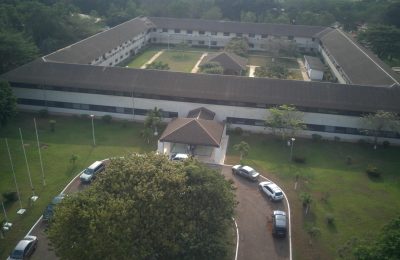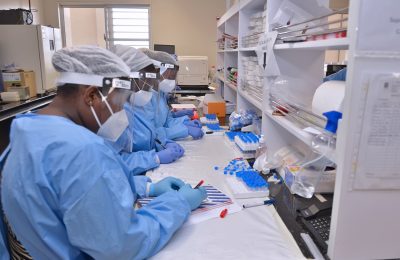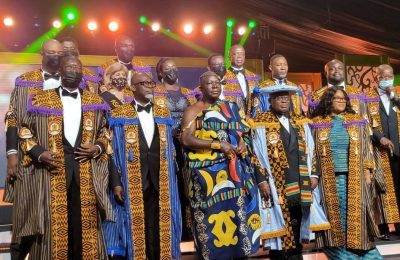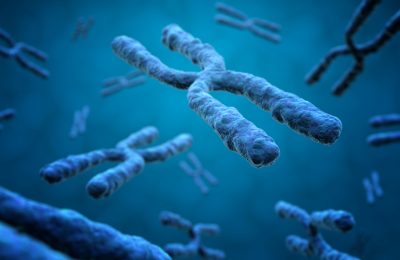- Home
- About
- Departments
- Research Activities
Advanced Research Center
Established in 2020
- Research Support Units
Co-ordinates All Activities Of The Institute
- Resources
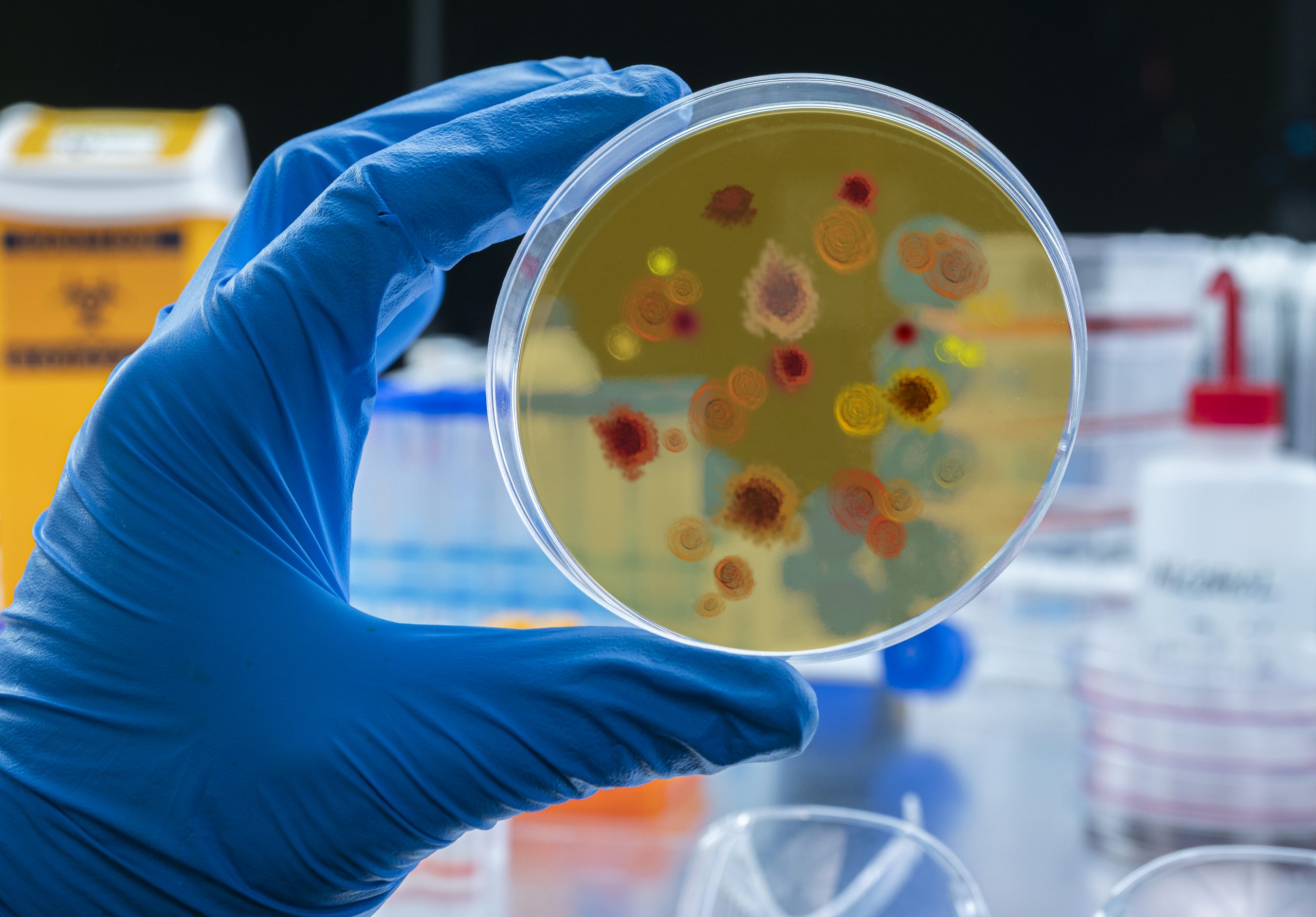
Immunology of malaria and coinfections
Lead Investigator(s)

Kwadwo Asamoah Kusi, PhD
Immunology of malaria and coinfections

Lead Investigator
Name of Lead PI
Project Summary
Project Background
My research is generally on assessing pathogen-induced cellular and humoral immune responses, with a special focus on Plasmodium falciparum. I am currently working on identifying HLA-restricted epitopes that elicit protection-associated T cell responses in individuals with a natural history of P. falciparum infection. We have identified a number of T cell epitopes in malaria antigens and, together with our collaborators, are in the process of expressing these as protein-based nanoparticle vaccine candidates.
Another major research focus is studies on multi-antigen and multi-allele vaccine formulation strategies that aim to overcome the strain-dependent effects of polymorphisms in immunogenic antigens on antigen-specific immune responses. Based on findings from these studies, that antigen polymorphisms can significantly impact the quality and potency of both antibody and T cell responses, we have proceeded to evaluate strategies that will overcome these polymorphic effects on immune responses, including the constitution of allelic antigen mixtures that have been shown to focus the immune response on shared epitopes, and the teasing out of conserved portion of antigens for constitution as vaccine candidates.
Yet another major research arm is the immunology of co-infections, and I am currently investigating the immunological interaction between hepatitis B and Plasmodium co-infections and their joint impact on the liver. We have recruited and are following chronic HBV-infected persons and geographically matched controls without HBV infection, and are monitoring their malaria infection status monthly for over a year. We expect to generate data that will be relevant for understanding the immune interaction between the two diseases and also for understanding outcomes of clinical trials for one disease in an environment where the other disease is also prevalent.
There are also ongoing research activities on natural products as therapeutics or immune system enhancers, studies on genomics and host-pathogen interactions in the elderly as well as vaccine clinical trials.
Project Background
My research is generally on assessing pathogen-induced cellular and humoral immune responses, with a special focus on Plasmodium falciparum. I am currently working on identifying HLA-restricted epitopes that elicit protection-associated T cell responses in individuals with a natural history of P. falciparum infection. We have identified a number of T cell epitopes in malaria antigens and, together with our collaborators, are in the process of expressing these as protein-based nanoparticle vaccine candidates.
Another major research focus is studies on multi-antigen and multi-allele vaccine formulation strategies that aim to overcome the strain-dependent effects of polymorphisms in immunogenic antigens on antigen-specific immune responses. Based on findings from these studies, that antigen polymorphisms can significantly impact the quality and potency of both antibody and T cell responses, we have proceeded to evaluate strategies that will overcome these polymorphic effects on immune responses, including the constitution of allelic antigen mixtures that have been shown to focus the immune response on shared epitopes, and the teasing out of conserved portion of antigens for constitution as vaccine candidates.
Yet another major research arm is the immunology of co-infections, and I am currently investigating the immunological interaction between hepatitis B and Plasmodium co-infections and their joint impact on the liver. We have recruited and are following chronic HBV-infected persons and geographically matched controls without HBV infection, and are monitoring their malaria infection status monthly for over a year. We expect to generate data that will be relevant for understanding the immune interaction between the two diseases and also for understanding outcomes of clinical trials for one disease in an environment where the other disease is also prevalent.
There are also ongoing research activities on natural products as therapeutics or immune system enhancers, studies on genomics and host-pathogen interactions in the elderly as well as vaccine clinical trials.
Objectives & Research Areas
Key Findings
Ongoing Activities
No data was found
Publication
Kusi KA, Ofori EA, Akyea-Mensah K, Kyei-Baafour E, Frimpong A, Ennuson NA, Belmonte M, Ganeshan H, Huang J, Amoah LE, Villasante E, Sedegah M (2021). Towards large-scale identification of HLA-restricted T cell epitopes from four vaccine candidate antigens in a malaria endemic community in Ghana. Vaccine. 2021 Dec 27:S0264-410X(21)01650-9.
Ofori EA, Tetteh JKA, Frimpong A, Ganeshan H, Belmonte M, Peters B, Villasante E, Sedegah M, Ofori MF, Kusi KA (2021). Comparison of the impact of allelic polymorphisms in PfAMA1 on the induction of T Cell responses in high and low malaria endemic communities in Ghana. (2021) 20:367
Nlinwe ONN, Ofori EA, Akyea-Mensah K, Kyei-Baafour E, Ganeshan H, Belmonte M, Peters B, Villasante E, Sedegah M, Kusi KA (2021). Comparative analysis of the ex vivo IFN-Gamma Responses to CD8+ T cell epitopes within allelic forms of PfAMA1 in Subjects with Natural Exposure to Malaria. PLoS ONE 16(9): e0257219
Kusi KA, Aggor FE, Amoah LE, Anum D, Nartey Y, Amoako-Sakyi D, Obiri-Yeboah D, Hollingdale MR, Ganeshan H, Belmonte M, Peters B, Kim Y, Tetteh JKA, Kyei-Baafour E, Dodoo D, Villasante E, Sedegah M (2020). Identification of Plasmodium falciparum circumsporozoite protein-specific CD8+ T cell epitopes in a malaria exposed population. PLoSONE 15(2): e0228177
Nlinwe O. N. N., Kusi, K. A., Adu, B. and Sedegah, M. (2018). T-cell responses against Malaria: Effect of parasite antigen diversity and relevance for vaccine development. Vaccine, 36 (17), 2237-2242.
Kusi KA, Faber BW, Koopman G and Remarque EJ (2018). EDiP: the Epitope Dilution Phenomenon. Lessons learnt from a malaria vaccine antigen and its applicability to polymorphic antigens. Expert Review of Vaccines, 17 (1), 13 – 21
Kusi KA, Manu EA, Gwira TM, Kyei-Baafour E, Dickson EK, Amponsah JA, Remarque EJ, Faber BW, Kocken CHM, Dodoo D, Gyan BA, Awandare GA, Atuguba F, Oduro AR, Koram KA (2017). Variations in the quality of malaria-specific antibodies with transmission intensity in a seasonal malaria transmission area of Northern Ghana. PlosONE, 12(9): e0185303
Ganeshan H, Kusi KA, Anum D, Hollingdale MR, Peters B, Kim Y, Tetteh JKA, Ofori MF, Gyan BA, Koram KA et al (2016). Measurement of ex vivo ELISpot interferon-gamma recall responses to Plasmodium falciparum AMA1 and CSP in Ghanaian adults with natural exposure to malaria. Malar J, 15:55. DOI 10.1186/s12936-016-1098-8
Kusi KA, Faber BW, van der Eijk M, Thomas AW, Kocken CHM and Remarque EJ (2011). Immunisation with different PfAMA1 alleles in sequence induces clonal imprint humoral responses that are similar to responses induced by the same alleles as a vaccine cocktail in rabbits. Malaria Journal, 10:40. doi:10.1186/1475-2875-10-40
Kusi KA, Faber BW, Riasat V, Thomas AW, Kocken CHM and Remarque EJ (2010). Generation of humoral immune responses to multi-allele PfAMA1 allele vaccines; effect of adjuvant and the number of component alleles on the breadth of response. PLoS ONE 5(11): e15391
Internal Collaborators
Dr. Kofi Bonney
Dr. Beverly Egyir
Dr. Evelyn Bonney
Dr. Adwoa Asante-Poku
External Collaborators
Dr. Martha Sedegah
Naval Medical Research Center, USA
Dr. Evelina Angov
Walter Reed Army Institute of Research, USA
Dr. Edmond J. Remarque
Department of Virology, Biomedical Primate Research Centre, Rijswijk, The Netherlands
Dr. Bart W Faber
Department of Parasitology, Biomedical Primate Research Centre, Rijswijk, The Netherlands
Dr. Kenneth Tachi
Liver Clinic, Korle Bu Teaching Hospital
Funders
Congressionally Directed Medical Research Program (CDMRP), USA
European and Developing Countries Clinical Trials Partnership (EDCTP), EU
University of Ghana Research Fund (UGRF)

